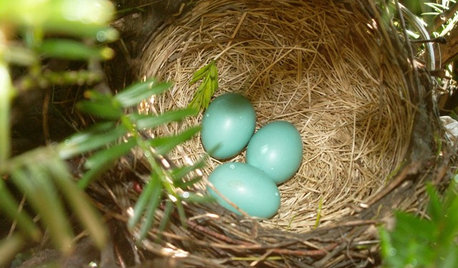What have you fed your worms today?
kathmcd7
14 years ago
Related Stories

GARDENING GUIDESHouzz TV: Make a Worm Bin for Rich Soil and Happy Plants
A worm-powered compost bin that can fit under a sink turns food scraps into a powerful amendment for your garden. Here’s how to make one
Full Story
GARDENING GUIDESHow to Keep Your Citrus Trees Well Fed and Healthy
Ripe for some citrus fertilizer know-how? This mini guide will help your lemon, orange and grapefruit trees flourish
Full Story
VINTAGE STYLEVintage Style: High-Tank Toilets
Homeowners are adding the feeling of yesteryear in today’s bathrooms
Full Story
UPHOLSTERYFabric Focus: Savor the Sensuousness of Silk
With its refined texture, resiliency and luxuriousness, silk has been popular since 3000 B.C. Here’s how to make it work in your home today
Full Story
VACATION HOMES10 Ways to Get the Rustic Cabin Look
The homespun charm of your childhood cabin can translate to your home today with these ideas from an interior designer
Full Story
KITCHEN DESIGNKitchen Workbook: 8 Elements of a Farmhouse Kitchen
Classic materials and vintage touches create a farm-style space that still feels fresh today
Full Story
MATERIALSTextile Textbook: The Joy of Jacquards
Here’s how a 19th-century invention led to a wealth of textile patterns for your home
Full Story
GARDENING FOR BIRDSWhat to Know About Birds Nesting in Your Yard
Learn how to observe, record data and help ornithologists with NestWatch’s citizen science project understand bird trends
Full Story
HOUZZ TOURSHouzz Tour: For the Love of a Cat in Philadelphia
Pet-friendly features integrated into a mod, eclectic and colorful home mean everyone in the family is happy
Full StorySponsored
More Discussions







Jasdip
sbryce_gw
Related Professionals
70037 Landscape Architects & Landscape Designers · Manorville Landscape Architects & Landscape Designers · Cockeysville Landscape Contractors · El Reno Landscape Contractors · Palos Verdes Estates Landscape Contractors · Porterville Landscape Contractors · Quincy Landscape Contractors · Kingsburg Landscape Contractors · Arlington General Contractors · Augusta General Contractors · Barrington General Contractors · Lake Forest Park General Contractors · Sun Prairie General Contractors · Warren General Contractors · Austintown General Contractorsgmreeves
mndtrp
11otis
coffeenut
lkittle
gringojay
coffeenut
mbetts
mndtrp
mndtrp
fosteem1
lkittle
coffeenut
mndtrp
folly_grows
sbryce_gw
gmreeves
coffeenut
sbryce_gw
coffeenut
coffeenut
susanfromhawaii